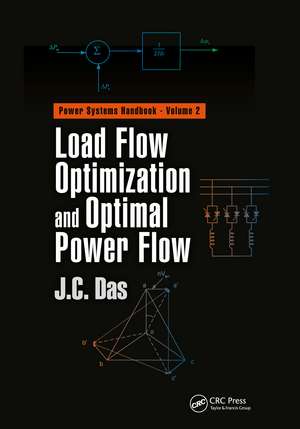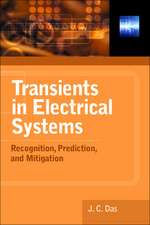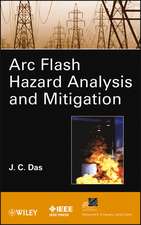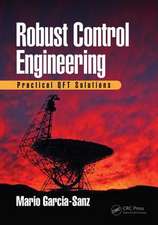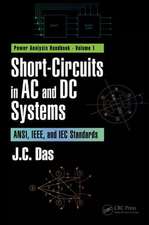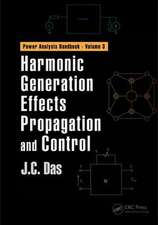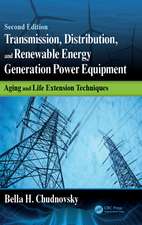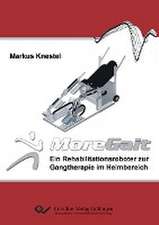Load Flow Optimization and Optimal Power Flow: Power Systems Handbook
Autor J. C. Dasen Limba Engleză Paperback – 12 iul 2022
| Toate formatele și edițiile | Preț | Express |
|---|---|---|
| Paperback (1) | 505.86 lei 43-57 zile | |
| CRC Press – 12 iul 2022 | 505.86 lei 43-57 zile | |
| Hardback (1) | 886.98 lei 43-57 zile | |
| CRC Press – 19 oct 2017 | 886.98 lei 43-57 zile |
Preț: 505.86 lei
Preț vechi: 549.84 lei
-8% Nou
Puncte Express: 759
Preț estimativ în valută:
96.83€ • 105.21$ • 81.39£
96.83€ • 105.21$ • 81.39£
Carte tipărită la comandă
Livrare economică 21 aprilie-05 mai
Preluare comenzi: 021 569.72.76
Specificații
ISBN-13: 9781032339443
ISBN-10: 1032339446
Pagini: 528
Dimensiuni: 178 x 254 x 32 mm
Greutate: 9.48 kg
Ediția:1
Editura: CRC Press
Colecția CRC Press
Seria Power Systems Handbook
ISBN-10: 1032339446
Pagini: 528
Dimensiuni: 178 x 254 x 32 mm
Greutate: 9.48 kg
Ediția:1
Editura: CRC Press
Colecția CRC Press
Seria Power Systems Handbook
Public țintă
Professional Practice & DevelopmentCuprins
1. Load Flow—Fundamental Concepts 2. Automatic Generation and Frequency Control—AGC and AFC 3. Load Flow over AC Transmission Lines 4. HVDC Transmission Load Flow 5. Load Flow Methods: Part I 6. Load Flow Methods: Part II 7. AC Motor Starting Studies 8. Reactive Power Flow and Voltage Control 9. FACTS—Flexible AC Transmission Systems 10. Three-Phase and Distribution System Load Flow 11. Optimization Techniques 12. Optimal Power Flow 13. Heuristic Optimization Techniques
Notă biografică
Dr. J.C. Das is currently the President of Power System Studies, Inc. Snellville, USA. He headed the Electrical Power Systems Analysis Department at AMEC Inc., (now AMEC Foster Wheeler, Inc.) Tucker, GA, USA, for the last 30 years. He has varied experience in the utility industry, industrial establishments, hydroelectric generation, and atomic energy. He is responsible for power system studies, including short-circuit, load flow, harmonics, stability, arc-flash hazard, grounding, switching transients, EMTP simulations, and protective relaying. He conducts courses for continuing education in power systems and has authored or coauthored approximately 65 technical publications, six textbooks, and over 7,000 total published pages.
Recenzii
"Control theory and optimization theory are both at the heart of the operation of power systems. The ever-growing complexity of power grids demands the deployment of modern control and optimization techniques. This book provides a detailed understanding of the operation of power systems, from modeling to the analysis of important control and optimization problems. The topics covered in this book span power systems, control theory, algorithms and nonlinear optimization. The materials are designed for undergraduate students in engineering but are up-to-date and will help graduate students identify significant research problems. This book offers an interdisciplinary perspective, which distinguishes itself from many other books on power systems."
—Javad Lavaei, University of California, Berkeley
"The book contains a modern, comprehensive and up-to-date treatise on power flows and their applications in the wider context of the optimization problem. As a bonus, the book covers additional topics such as stability, security and transmission control. AGC and generation control is also discussed in great detail, including modern topics such as deregulation, auctions and NERC reliability criteria. Modeling details specific to HVDC, advanced numerical methods such as second order methods and load modeling receive fair treatment, which is important for engineers and scholars seeking techniques going beyond the basics. A plethora of optimization techniques are rigorously explored and meet the expectations of book on load flow optimal methods. Finally, the book offers a fresh introduction to evolutionary programming techniques, many of which are still being developed in the research literature. This provides a preview on current trends and efforts on metaheuristic optimization algorithms."
— Abdelrahman (Abdel) Karrar, University of Tennessee at Chattanooga
"If the reader is looking for a clear exposition on a current hot topic, namely, power flow optimization, this book will end the search. The book is very well-organized, maintaining a logical flow chapter after chapter. Each topic is clearly explained and has explicit computation to solve relevant toy examples helps the reader in thoroughly grasping the subject. The book has a great potential to quickly become a standard textbook on the topic."
— Dhagash Mehta, United Technologies Research Center, East Hartford, CT, USA
"The book presents how to apply the optimization techniques to a power system and the means of formulating an optimal power flow. The development of the objective function, constraints, and controls are introduced and fully developed. Different solution techniques to solve optimal power flow problems are discussed.
Overall, this is a great book for power system engineers involved in power flow and optimal power flow studies. It is an excellent reference for power system engineers as for graduate students in the area of power systems. The text is easy to read and presents modeling principles and solution techniques one can readily apply."
—IEEE Power & Energy Magazine, September/October 2018 Issue
—Javad Lavaei, University of California, Berkeley
"The book contains a modern, comprehensive and up-to-date treatise on power flows and their applications in the wider context of the optimization problem. As a bonus, the book covers additional topics such as stability, security and transmission control. AGC and generation control is also discussed in great detail, including modern topics such as deregulation, auctions and NERC reliability criteria. Modeling details specific to HVDC, advanced numerical methods such as second order methods and load modeling receive fair treatment, which is important for engineers and scholars seeking techniques going beyond the basics. A plethora of optimization techniques are rigorously explored and meet the expectations of book on load flow optimal methods. Finally, the book offers a fresh introduction to evolutionary programming techniques, many of which are still being developed in the research literature. This provides a preview on current trends and efforts on metaheuristic optimization algorithms."
— Abdelrahman (Abdel) Karrar, University of Tennessee at Chattanooga
"If the reader is looking for a clear exposition on a current hot topic, namely, power flow optimization, this book will end the search. The book is very well-organized, maintaining a logical flow chapter after chapter. Each topic is clearly explained and has explicit computation to solve relevant toy examples helps the reader in thoroughly grasping the subject. The book has a great potential to quickly become a standard textbook on the topic."
— Dhagash Mehta, United Technologies Research Center, East Hartford, CT, USA
"The book presents how to apply the optimization techniques to a power system and the means of formulating an optimal power flow. The development of the objective function, constraints, and controls are introduced and fully developed. Different solution techniques to solve optimal power flow problems are discussed.
Overall, this is a great book for power system engineers involved in power flow and optimal power flow studies. It is an excellent reference for power system engineers as for graduate students in the area of power systems. The text is easy to read and presents modeling principles and solution techniques one can readily apply."
—IEEE Power & Energy Magazine, September/October 2018 Issue
Descriere
This book discusses the major aspects of load flow and culminates in modern heuristic optimization techniques and evolutionary programming. In the deregulated environment, the economic provision of electrical power to consumers requires knowledge of how to maintain a certain power quality and load flow; this knowledge is provided in the text.
